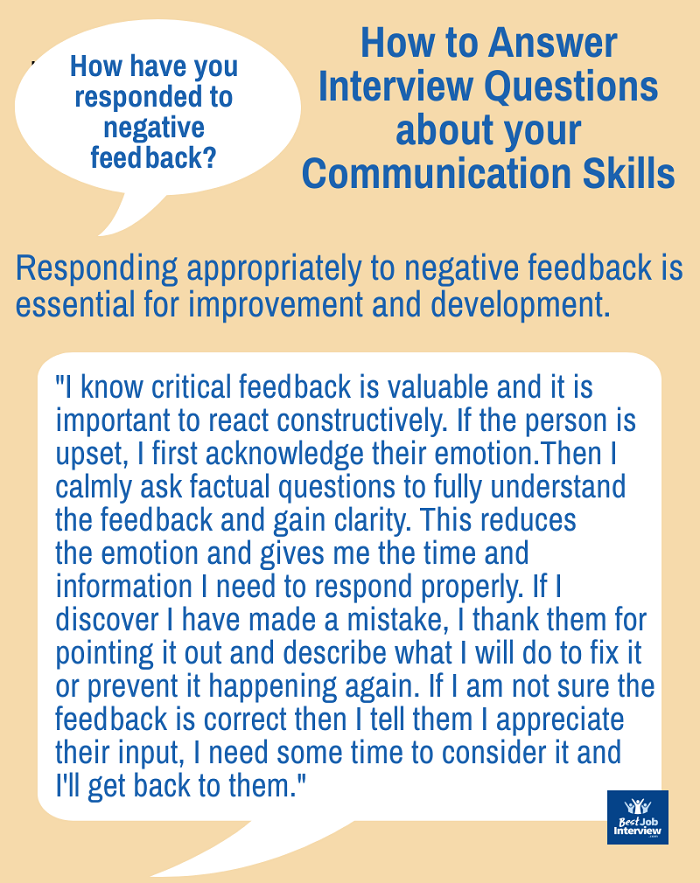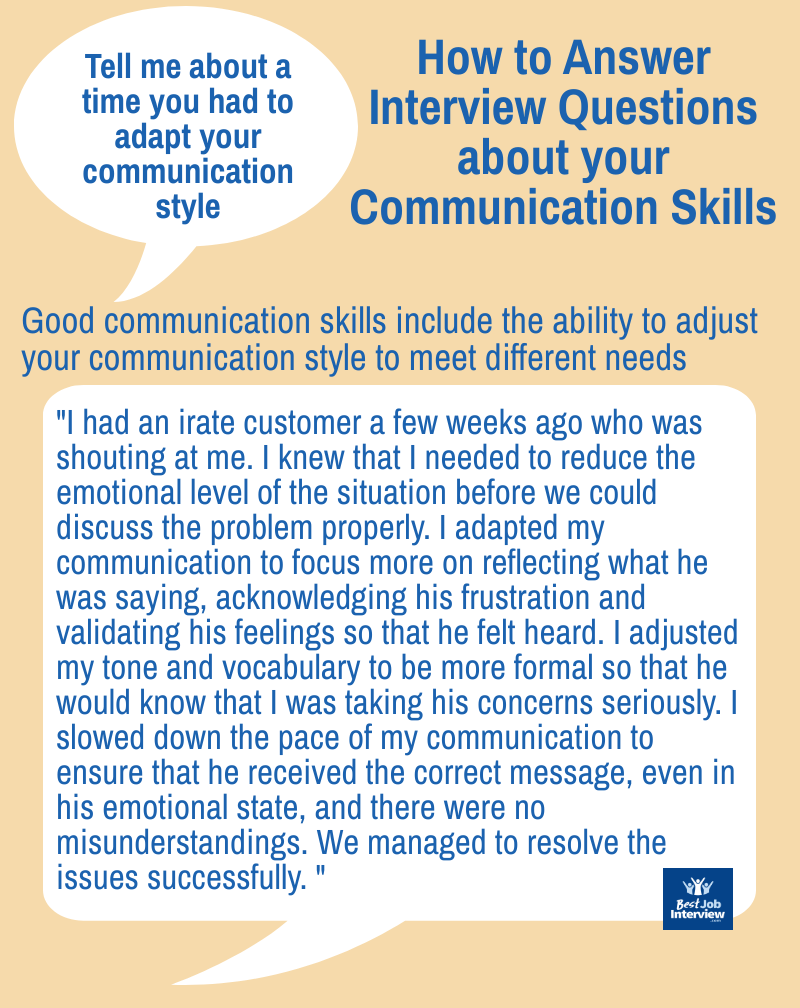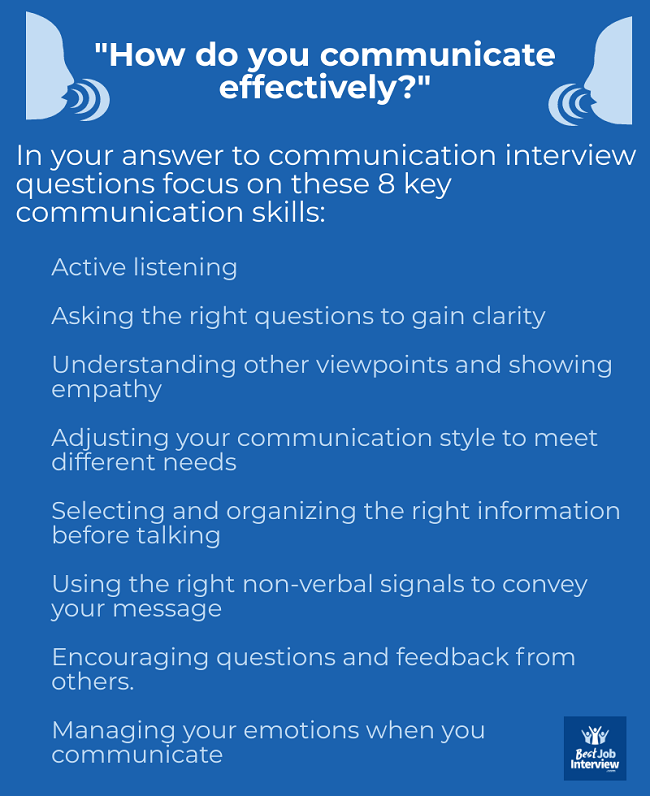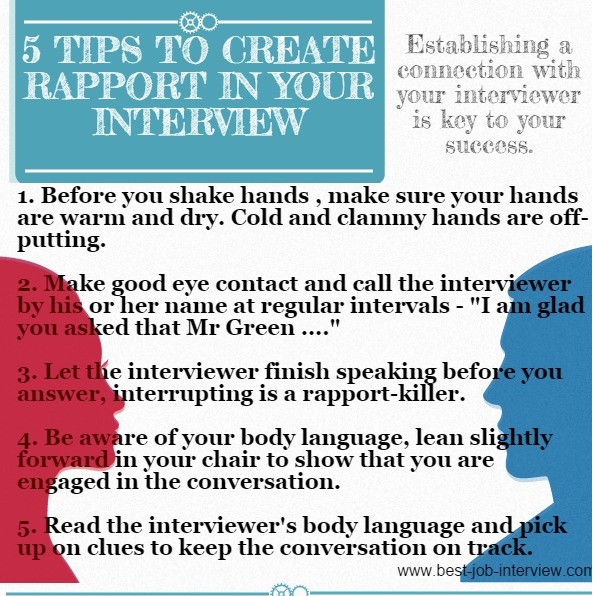- Home
- Job Interview Questions
- Communication Skills
Communication Skills
Interview Questions
List of communication skills interview questions. Most jobs demand communication with other people - customers, clients, colleagues - and the ability to communicate is closely evaluated in the job interview.
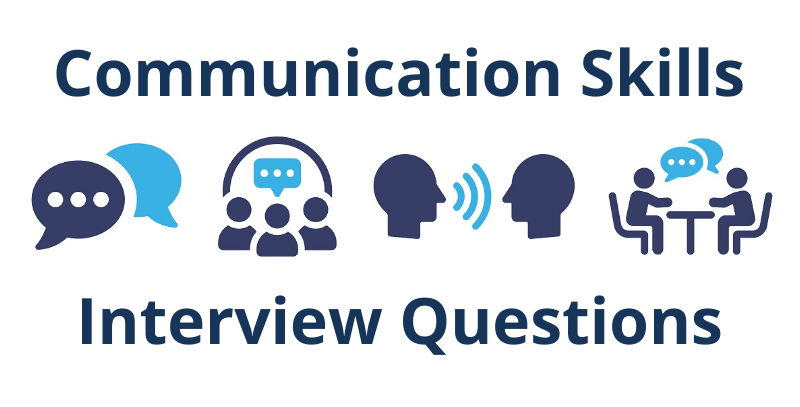
This is done in two ways:
- asking competency-based or behavioral interview questions that explore the candidate's communication skills
- noting the candidate's ability to communicate during the interview
List of Communication Skills Interview Questions
This is a comprehensive list of communication behavioral interview questions that ask for specific examples that demonstrate communication abilities in a work environment.
- How have you simplified a complex issue in order to gain understanding from a customer or colleague?
- Tell me about a tough conversation you had to have with a team member.
- Give me an example of when you had to use your persuasiveness at work.
- Tell me about a time there was a miscommunication at work. How did you handle it?
- Describe a time you had to ask questions and listen carefully to clarify the exact nature of a customer's/colleague's concern.
- Tell me about a time you had to adjust your communication style to adapt to a person from a different background or culture.
- Describe a time when you had to express your ideas in a meeting.
- How have you responded to negative feedback?
- Tell me about a time you received unclear instructions from your supervisor. What did you do?
- Tell me about a time you had to talk to an angry customer. What steps did you take?
- Tell me about a time that other members of the team disagreed with your idea. How did you respond?
- What challenges have you faced in communicating with your manager. How have you handled these?
"Tell me about a time when you have had to adapt your communication style"
This is a typical communication skills interview question and should be prepared for beforehand. Use this good sample interview answer to help you.
"What are your strengths and weaknesses in communication?"
You are likely to be asked to describe your communication strengths and weaknesses. Here are some good examples of strengths and weaknesses in communication that may resonate with you and will help you to understand your own strengths and weaknesses when communicating.
Communication Strengths:
- able to speak with confidence in a clear and audible voice
- able to express ideas and information clearly and in a way that is easily understood by your audience.
- able to provide and receive feedback in a constructive manner
- able to select the right communication style for each individual listener
- having adequate and correct information to support your message
- able to simplify complex information where necessary
- displaying appropriate body language that reinforces the message you are trying to get across
- able to persuade others to a desired outcome
- able to negotiate to achieve a desired outcome
- able to listen actively and ask appropriate questions to gain clarity
- able to efficiently process and analyze large quantities of information
- able to see the other person's point of view
- shows respect for others' contribution
Communication Weaknesses:
- lack of confidence impacts negatively on your communication and compromises the message you are trying to get across
- cultural barriers prevent a clear understanding of each other
- anxious about expressing your own opinions or disagreeing with others
- using hesitations and excessive use of conversation fillers such as "you know", "like", "um"
- bombarding with too much information at one time
- providing inadequate or incorrect information
- not listening with your full attention and easily distracted
- not asking questions to clarify or confirm that the right message has been received
- not sensitive to body language or unable to correctly read non verbal cues
- not adapting communication style to the listener or audience
- not understanding the context of the conversation
Good Communication - The Key Skills
In answers to communication skills interview questions including "How would you describe your communication skills?" give consideration to the following key criteria for good communication.
- Listening actively by being fully present and not allowing distractions.
- Asking questions to gain clarity and ensure the right message is received.
- Never assuming, always clarifying.
- Understanding other viewpoints and displaying empathy.
- Building relationships by showing a sincere interest in what others have to say.
- Adjusting your communication style to meet the needs of the audience and the specific situation.
- Giving sufficient thought to what you want to achieve with your communication.
- Spending some time preparing what you want to say.
- Selecting and organizing the right information for the right person in the
right situation before communicating.
- Presenting facts and being specific, clear and concise.
- Using the right verbal and non-verbal signals to influence and persuade others to take action.
- Being able to simplify and help others understand complex information
- Encouraging questions and feedback from others.
- Being aware of non-verbal cues.
- Taking responsibility for your own reactions by using "I" messages
- Managing your emotions when you communicate, consciously choosing your reaction rather than responding without thinking.
You can find good examples of behavioral interview answers here.
Collaboration interview questions and answers
Written communication skills can be evaluated using the following interview questions.
Written Communication Skills Interview Questions
- What kinds of writing have you done in your job? Can you give me an example?
- Have you ever written instructions for other people? How did you go about this.
- Tell me about a response you wrote to a customer complaint.
- Describe a time when you had to use your written communication skills to get an important point across.
Remember your resume is the first indication the employer gets of your written communication skills. Find out how to write an excellent resume.
A well written cover letter reinforces your strong written communication skills.
How to Demonstrate Good Communication Skills During the Interview
- Make sure the interviewer has finished the question before answering. Take a pause to think about the question before answering which helps you organize your thoughts and ensures the interviewer is finished talking.
- Ensure you receive the right message by asking appropriate questions and clarifying what is wanted. Use a feedback loop to check your understanding - "So what you would like me to tell you about is ..."
- Adapt your approach to the style of the interviewer. Find out more about how to develop rapport in your interview.
- Express yourself clearly, concisely and confidently by selecting the relevant details and putting them forward in an organized and considered manner.
- Use appropriate language - be aware of your grammar and vocabulary, avoid sloppy words like "kind of" and "sort of"
- Avoid meaningless conversation fillers like "um" and "you know"
- Be conscious of your delivery - the rate at which you speak and the volume. Job candidates tend to talk fast because they are nervous so be aware of this and take a breath between sentences. Find out how to control interview nerves.
- Be aware of your body language - maintain good eye contact, insert smiles where appropriate, check your posture and avoid fidgeting. Find out more about the right interview body language.
- Engage the interviewer throughout by asking smart questions.
How to Create Rapport in your Job Interview
Confidence is critical to good interview communication. Preparation is key to confidence. Use this interview checklist to make sure you are ready to shine in your interview.
Common Job Interview Questions and Answers
Select the communication skills interview questions that apply to the job description of the position.
